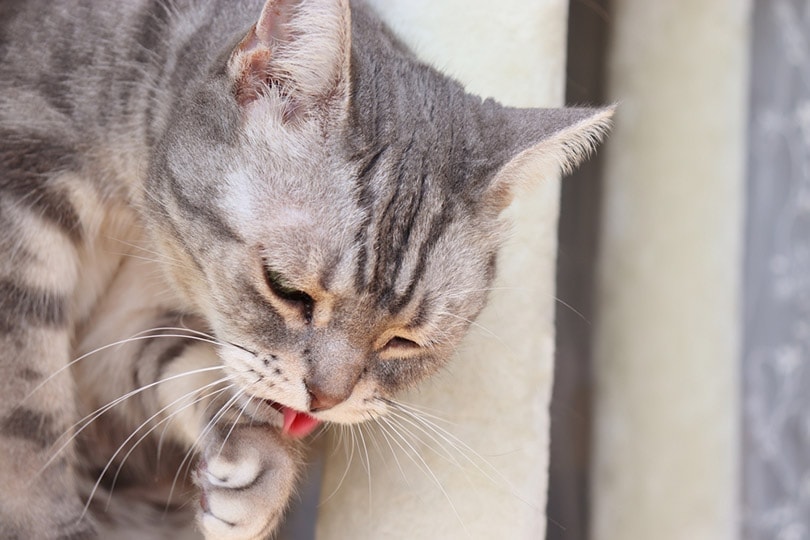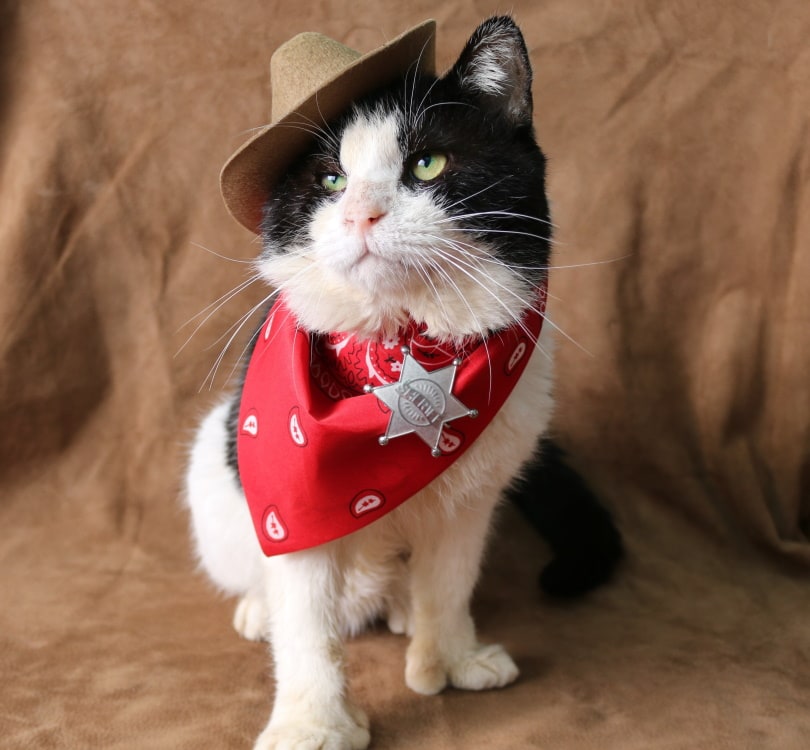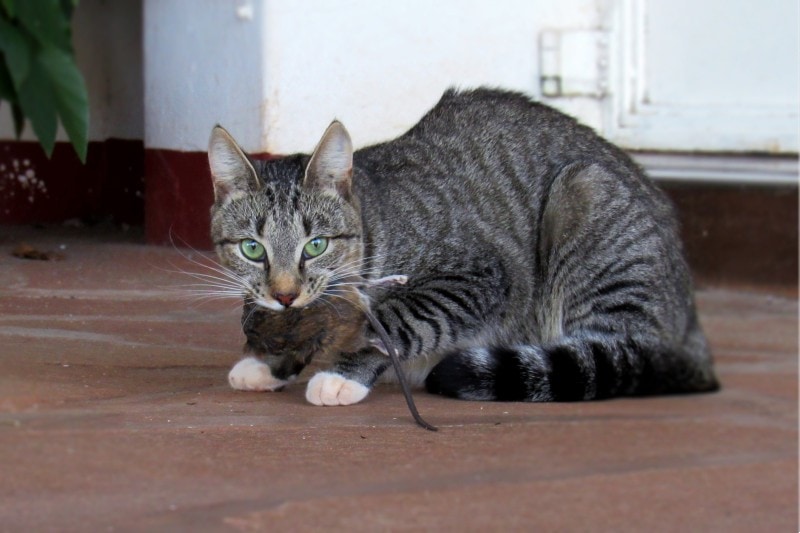Why Does My Cat Sleep in the Bathroom? 7 Vet-Reviewed Reasons
By Kit Copson
Updated on

It’s a tale as old as time: You splash out on plush beds and fancy cat condos only to find that your cat prefers far less elegant locations to snooze in. Some cats love hanging out and sleeping in the bathroom and, though this may seem strange, there are a few perfectly reasonable explanations for this behavior.
We’ll explore those reasons in this post.
It’s important to always be mindful of your cat’s whereabouts while they are in the bathroom, particularly if this is where your washing machine or dryer is. Cats are curious and may try to enter the washing machine or the dryer, as they are warm after a cycle. We can’t stress enough how important it is that they stay out of these appliances at all times, as they will often suffer fatal injuries if the machine or dryer is started while not knowing the cat is inside. As silly and unlikely as it sounds, it happens too often not to be warned about.
The 7 Possible Reasons Why Cats Sleep in the Bathroom
1. It’s Nice and Cool
If your cat seems to spend more time in the bathroom during the summer months, it could be that the temperature in there is just right. Bathrooms tend to contain materials like ceramic, porcelain, and linoleum, and these make for smooth and cool surfaces to sleep and chill out on.
2. The Sink Is Perfectly Curved
When you look at the shape of a bathroom sink, it’s easy to understand why many cats love them. They’re perfectly curved, so are just the right fit for a snoozing cat’s body, as well as being cool for cats trying to escape the hot summer weather. In addition, the curved sides may make your cat feel safe and secure.
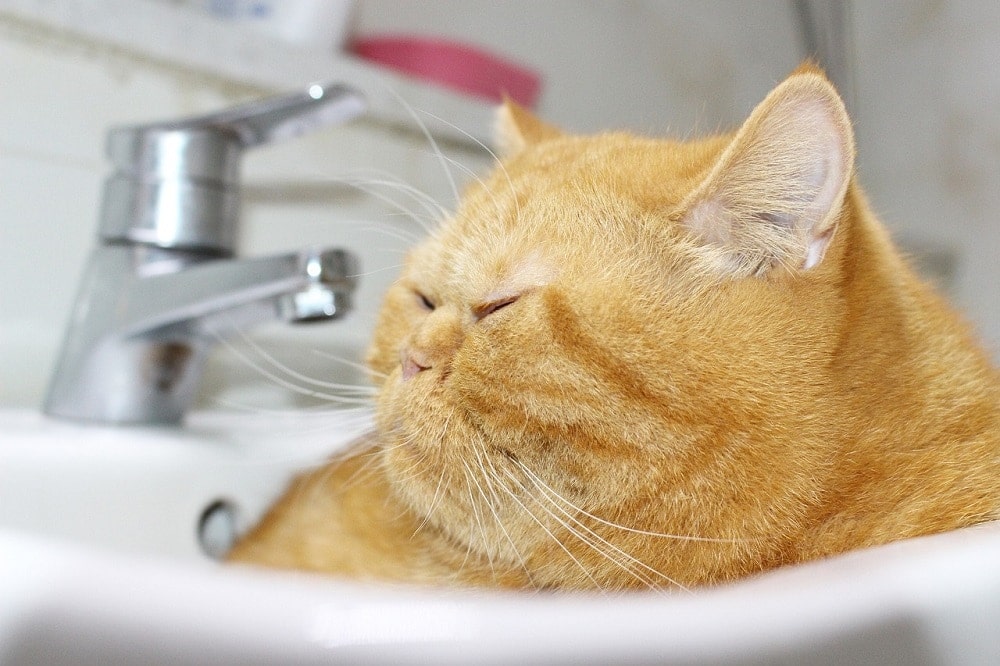
3. Bathrooms Are a Water Source
Cats naturally gravitate toward areas with running water because of the habits of their wild ancestors. In the wild, cats prefer drinking from water sources that flow rather than those that remain stagnant, as they are instinctively drawn to motion. Stagnant water sources are also more likely to contain bacteria, but we don’t know if cats are actually aware of that.
Running water is fresher and far more interesting to cats. So, if you’ve got a leaky tap, you can bet your bathroom-loving cat is waking up after a nap and heading straight for it.
4. It’s Quiet
The bathroom is one of the quietest, least populated spots in the house, so it’s no wonder cats like to retreat to it for a good doze. A lot of noise can be overwhelming for cats, especially shyer, more reserved cats.
5. Bathrooms Intrigue Cats
Your cat could have initially developed a penchant for chilling in the bathroom out of pure curiosity. Bathroom doors are often shut—something we all know cats greatly disapprove of—and will lead to them employing various tactics to gain entry to the mysterious room (especially if you’re in there). Once they finally get to explore, many cats enjoy the bathroom so much that they decide to make a habit of spending time there.

6. The Bathtub Is a Good Hiding Spot
Cats are at their most vulnerable when they’re sleeping and appreciate being in spots that feel somewhat enclosed (but not too much). If you have a bathtub, your cat may like to sleep in it because it’s deep enough to keep them hidden, but not so deep that they can’t easily jump in and out. However, most prefer other spots, such as the actual sink or your nicely folded, warm clothes.
7. Your Cat Is Sick
A cat’s love of the bathroom is usually nothing to worry about, but if your cat has started retreating there regularly, or suddenly, and has not done it before, it’s possible that they might not be feeling their best.
Cats that are unwell tend to hide out more than usual, and some are drawn to areas with a good water supply. For example, cats with kidney disease and diabetes are known for drinking more water than usual, and the bathroom has this in abundance. Watch out for changes in your cat’s behavior and physical condition and inform your vet if you suspect something isn’t right.
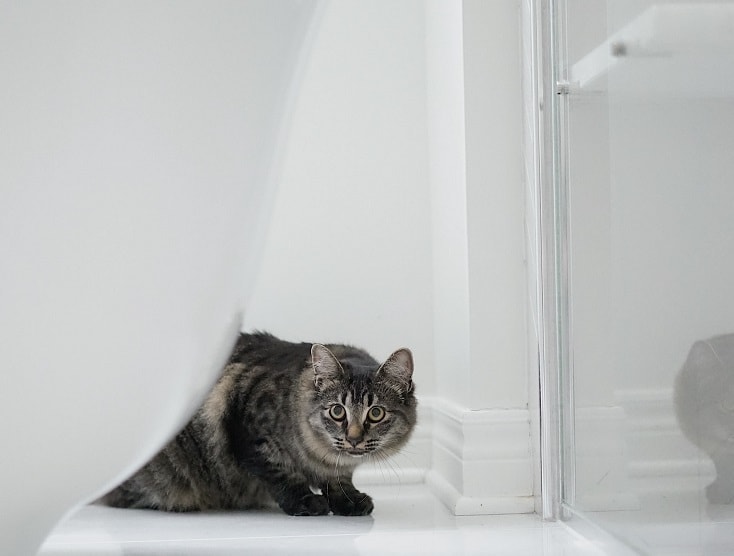
Why Does My Cat Follow Me to the Bathroom?
The bathroom isn’t merely a comfy sleeping zone for cats, but it’s also a place they’re sure to get attention. As we all know, cats don’t usually take kindly to being shut out of the bathroom while you’re using it, simply because they don’t appreciate being denied the opportunity to quench their curiosity.
Once they’ve bullied their way in and found you sitting on the toilet, many cats quickly figure out that you’ve little else to do but shower them with attention—and they love that!
Especially devoted cats may want to come in simply to be around you, and it may also be a common habit of cats with separation anxiety. Some cats feel especially vulnerable being left alone and want to make sure they stick with their “protector” (that’s you) at all costs.
Conclusion
Bathrooms are the ideal spots for some cats to luxuriate, cool down during hot spells, and get ample attention from you, so it’s no surprise many felines can be found snoozing the afternoon away on the tiles or in the sink. Bathrooms are also very private places and can instill in cats a real sense of safety and tranquility. To sum up, in your cat’s world—a world in which they are royalty—the bathroom is the palace they deserve.
However, if you have any concerns about your cat’s health, if they are drinking more than usual, or if hiding in the bathroom and it’s unlike them, get them checked out by your vet to make sure there isn’t an underlying health issue.
Featured Image Credit: mama_mia, Shutterstock


